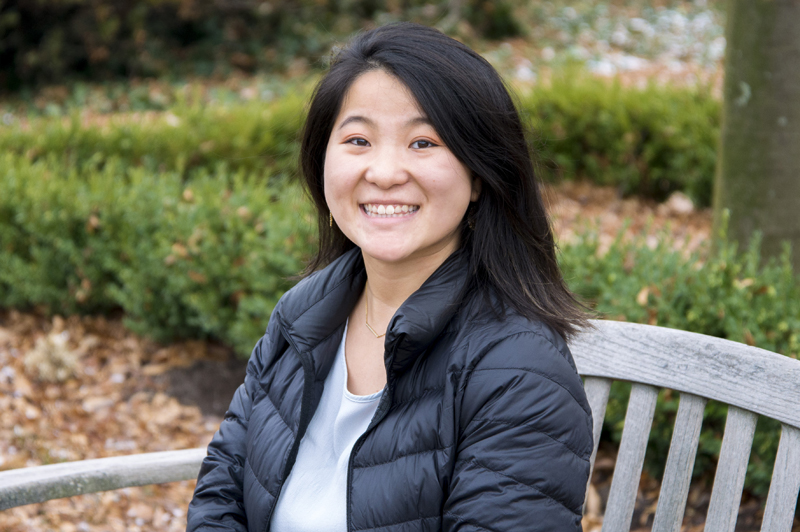Harpur student spotlight: Samantha Ng
Asian and Asian American studies major focuses on political advocacy

Samantha Ng believes that Asian-American representation in politics starts with amplifying the voice of the youth.
“Asian-Americans and Pacific Islanders are the largest-growing, eligible voting population in terms of communities of color,” Ng said. “As youth, we have to recognize that in order to mobilize ourselves, we need to gain political consciousness.”
Ng, a native of Manhattan, is a senior double majoring in Asian and Asian American studies (AAAS) and human development. Her focus of study primarily lies within civic engagement among Asian Americans, though more specifically voting rights.
According to Ng, she was first exposed to Asian-American studies as a senior in high school, when she joined the Asian American Activism Student Advocacy Project — an organization that works with students in the five New York City boroughs to discuss issues that affect the local community.
“I was going to a predominantly Caucasian high school in the Upper West Side, and I only had a handful of friends who were the same racial identity as me,” Ng said. “I think that having this experience in high school of doing organizing and advocacy really propelled me to want to learn more about the Asian-American community.”
This early exposure to political advocacy is what led her to major in Asian and Asian American studies at Binghamton University. The course that got her most interested in the major was Assistant Professor Cynthia Marasigan’s class on race and citizenship.
“The class was difficult for me because of how uncomfortable it made me to learn beyond what I’ve been learning from a textbook,” Ng said. “It challenged me to think about the power structures and institutions I lived by that formed my identity, like public school education, and it made me uncomfortable because I didn’t realize how affected I was until I learned about the history.”
The senior’s research goes beyond the Binghamton community. During her junior year, Ng studied the relationship between Asian-American youth and political engagement. For the project, she interviewed various students involved with Asian-American civic engagement on their college campuses, including Duke University and Texas A&M University.
“What came about from this project was a dense ethnography that showed how the youth voices of Asian-Americans are important to civic engagement in our communities,” Ng said. “Asian-Americans are one of the leading and fastest growing ethnic groups, and it goes to show that we need a seat at the table when decisions are made that affect communities of color.”
Two summers ago, Ng interned in Washington, D.C., for a non-profit organization called Asian and Pacific Islander American Vote (APIAVote), which aims to mobilize Asian Americans and Pacific Islanders in electoral and civic participation. One of the projects she worked on was the YouthVote campaign, which encouraged Asian American youth across the United States to register to vote.
Ng now serves as the community partnership coordinator on the national board of the East Coast Asian American Student Union (ECAASU), a student-run non-profit organization that aims to inspire, educate and empower those interested in Asian-American and Pacific Islander issues.
“The things that I do there are integral to what I’ve been doing on campus as an AAAS student, which is community organizing and advocacy,” Ng said. “My work in ECAASU has allowed me to actualize what I’ve been learning in college by working with students across the East Coast who also support Asian-Americans and Pacific Islanders.”
As a student at Binghamton University for more than three years, Ng said the amount of faculty support students receive in the AAAS is what makes the department stand out.
“My work is primarily in Asian-American studies, but I get support from faculty in Asian studies as well. I’ve been able to take classes from the department that aren’t just Asian-American studies-focused, but instead focus on contemporary politics in Asia,” Ng said. “By taking these classes, I’ve been able to develop relationships with faculty.”
Ng also said the department’s speaker series is something students should notice when considering AAAS.
“The department brings stellar, exceptional speakers to Binghamton University, and I think that’s something that’s overlooked on campus,” Ng said.
After graduation, Ng plans to either work in community engagement for a non-profit organization or work under a member of Congress to gain experience in policy-making.
As of now, she hopes to continue creating positive changes within the Asian-American community and encouraging others to support the AAAS Department.
“In the past, there was a lot of discrimination and violence that Asian-American students had to face, which ultimately pushed for Asian American studies,” Ng said. “Just having this department at Binghamton University is really critical to Asian American youth today, especially as college students.”
